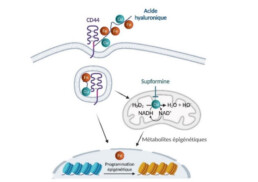Inflammation and cancer: the role of copper identified
A new study published in the journal Nature has identified A druggable copper-signaling pathway that drives inflammation. The study was led by researchers from the Institut Curie in Paris, France, with involved members of ICGex and Curie Bioinformatics platforms.
Inflammation is a natural response of the immune system to infection and tissue damage. However, when inflammation becomes chronic, it can lead to a range of diseases, including arthritis, heart disease, and cancer. Therefore, understanding the mechanisms that drive inflammation is crucial for developing new treatments for these diseases.
They showed in the study that the cell surface glycoprotein CD44, mediates the uptake of metals including copper. They identified a pool of chemically reactive copper(II) in mitochondria of inflammatory macrophages that catalyses NAD(H) redox cycling by activating hydrogen peroxide. Maintenance of NAD+ enables metabolic and epigenetic programming towards the inflammatory state. Targeting mitochondrial copper(II) with a drug called supformin (LCC-12), a rationally designed dimer of metformin, induces a reduction of the NAD(H) pool, leading to metabolic and epigenetic states that oppose macrophage activation. LCC-12 interferes with cell plasticity in other settings and reduces inflammation in mouse models of bacterial and viral infections.
These results point to new therapeutic opportunities in the control of inflammation and cancer.


